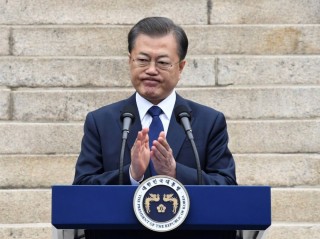Loading
Search
▼ Moon’s Olympic Absence Points To Protracted Stalemate With Japan
- Category:Other
South Korean President Moon Jae-in’s decision to forgo attending the Tokyo Olympics, thereby missing a chance to meet with Prime Minister Yoshihide Suga, has highlighted the increasingly slim prospects that the two neighbors can quickly bridge their differences after years of festering grievances over historical, political and economic issues.
Instead, both sides find themselves at a stalemate, making it even less likely that ties will improve anytime soon. The situation is particularly troublesome for the United States, which is counting on unity between the two to build a united front against China and North Korea.
Moon had reportedly been expected to arrive Friday, the day of the opening ceremony, and meet with Suga for their first face-to-face summit talks — a possible step toward reinvigorating the relationship between the two neighbors.
The sense in Nagatacho — Japan's political heart — is that Seoul had concluded that, absent a more formal summit, any potential meet-up would merely be ceremonial, yielding few results.
That's because Suga would also be expected to meet with other leaders and attendees as part of his official duties. Moon was also said to have demanded that Tokyo relax tightened export control rules on South Korea, a condition Japan was unwilling to accept, according to multiple media reports.
But it was a Japanese diplomat’s disparaging comments about Moon, in which he compared the president's efforts to improve ties with Tokyo to “masturbating,” that ultimately dissuaded Moon from visiting for the Olympics.
The comments “acted as a significant obstacle," South Korean Vice Foreign Minister Choi Jong-kun was quoted as saying by the Yonhap news agency on Tuesday.
Suga previously said in a news conference that he would greet Moon with “diplomatic courtesy” if the president visited. At the same time, the prime minister was reluctant to set aside a period for a substantive bilateral meeting unless Moon proposed solutions to court decisions on compensation over the issues of wartime labor and so-called comfort women, who suffered under Japan’s military brothel system before and during World War II. Japan has deemed those decisions to be violating international law.
“South Korea was concerned that for the president, who was ridiculed (with the disparaging comment) and would receive no special treatment, simply attending the Olympics and coming back would not present himself well in the eyes of the public,” said Tadashi Kimiya, a professor of South Korean politics and diplomacy at the University of Tokyo.
At the same time, said Kimiya, “Japan also wasn’t desperate to have Moon visit,” since Suga had concluded that Moon would not be bringing proposals Tokyo deemed satisfactory.
Moon was initially eager to attend the Tokyo Games, hoping to deploy “Olympic diplomacy” as a way of resuming stalled nuclear negotiations between North Korea and the U.S. But any hopes Moon had of re-creating a breakthrough with Pyongyang similar to that seen at the 2018 Pyeongchang Olympics were dashed when North Korea backed out of the Games in April.
Still, the Tokyo Olympics could have been a chance for face-to-face discussions related to Seoul and Tokyo’s deteriorating bilateral relationship, which became particularly tense in the aftermath of South Korean Supreme Court rulings in 2018 that ordered Japanese firms to pay compensation for wartime forced labor.
The judicial decision contradicted Tokyo's view that the 1965 pact establishing diplomatic relations settled all post-colonial compensation issues, including those of both wartime labor and comfort women.
The ruling unleashed a litany of tit-for-tat moves, with Tokyo tightening controls on exports of certain chemicals to South Korea and Seoul threatening to terminate a key military-intelligence sharing pact.
Since then, South Korean courts have delivered contradictory verdicts on awarding compensation to plaintiffs claiming physical and psychological damage from Japanese firms and the government.
Moon and Suga spoke briefly on the sidelines of the Group of Seven meeting in England last month, but Japan has remained adamant that unless the South Korean government proposes solutions to rectify those judicial decisions, restoring trust will be a challenge. Amid these divisions, a more formal meeting failed to materialize.
Tokyo has been skeptical of Moon’s motives for taking a softer tone with Japan in recent months, as he attempted early in his presidency to cast doubt over the legitimacy of a separate 2015 deal on comfort women that marked “the final and irreversible resolution” of the issue.
Going into this week, expectations that the two leaders would achieve a breakthrough in a single meeting were low. Although leaders may feel inclined to meet each other as a formality, it is difficult to have in-depth discussions on the sidelines of the Olympics, especially about sensitive matters, one senior administration official said last week.
Nevertheless, Moon was eager to obtain a major concession from the Japanese side: He was pushing for Tokyo to lift strict controls on exports to Seoul of high-tech materials implemented in the summer of 2019.
South Korea claims the action by Japan was politically motivated, while Tokyo has cited national security concerns as justification for its action.
With Moon skipping the Olympics, it’s unlikely that the two leaders will be able to meet in person anytime soon.
COVID-19 cases are soaring in both countries and Suga must hold a general election by the autumn, while the race to select Moon’s successor is already heating up.
From Washington’s perspective, any breakthrough may not happen until after the South Korean presidential election in March 2022.
“The elections are not going to solve the deeper problems but they may provide a chance to take a fresh approach, ”said Daniel Sneider, a lecturer in East Asian studies at Stanford University.
For now, neither side is backing down.
“We’ll continue to strongly urge South Korea to take appropriate actions based on our coherent position,” Chief Cabinet Secretary Katsunobu Kato said Tuesday.
- July 20, 2021
- Comment (0)
- Trackback(0)


